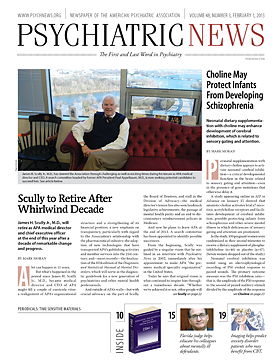For a decade now, APA has conducted a fellowship program to help advance the careers of psychiatrists interested in child and adolescent psychiatry.
Cathryn Galanter, M.D., a visiting associate professor of psychiatry and director of the Child and Adolescent Psychiatry Training Program at New York’s SUNY Downstate Medical Center in Brooklyn is, as she puts it, the “proud founder” of the program.
“When I was a child and adolescent psychiatry fellow, I saw the need for a fellowship to engage general psychiatry residents in child psychiatry, as children’s mental health was, and still is, greatly underserved,” she explained. “We first proposed the idea of the fellowship to the APA Council on Children, Adolescents, and Their Families. They were very supportive of the idea, but not able to secure funding. Our next step was to write an action paper and present it to the APA Assembly. The action paper stated the importance of the fellowship and requested that APA look into funding the program. The action paper was approved. Soon after, funding was secured.”
The two-year fellowship, open to PGY-1 through PGY-3 APA members, is financed by an unrestricted educational grant from Shire Pharmaceuticals. During the first year, fellows attend the APA annual meeting as participants, meet individually with their mentors, get together as a group with other fellows, and attend sessions focused on child and adolescent psychiatry. After the annual meeting, each fellow develops, with the help of his or her mentor, a proposal for a symposium or workshop at the next APA annual meeting.
During the second year, if their proposals are accepted, the fellows present their symposia or workshops. They are also encouraged to attend the meetings of the APA Council on Children, Adolescents, and Their Families, which offers them networking and mentoring opportunities and exposes them to development of policy that will affect the practice of psychiatry and especially treatment of mentally ill youth.
One of the fellows selected for 2012-2013 is Erica Greenberg, M.D., a PGY-3 at Harvard University. “I’ve had a longstanding interest in child and adolescent psychiatry, and the fellowship seemed like the perfect opportunity to increase my direct involvement with the child and adolescent psychiatry community,” Greenberg told Psychiatric News.
Another of the fellows selected for 2012-2013 is Dawn Sung, M.D., a PGY-3 at New York University. “I applied for the fellowship because of my interest in child and adolescent psychiatry and a desire to become more involved with APA as a trainee,” she said. “I also have a special interest in cultural issues, given my own background as a second-generation Korean American. . . . It has been a great experience to not only attend the APA annual meeting and meet other residents with similar interests, but also to be paired with a mentor, Dr. Andres Pumariega, who has accomplished a great deal with cultural issues pertaining to child and adolescent psychiatry. With his support and mentorship, I have been able to submit a proposal for a workshop for the 2013 APA annual meeting addressing intergenerational conflict within immigrant families.”
Mikel Matto, M.D., a PGY-2 at the University of California, San Francisco, is another fellow chosen for 2012-2013. “The beauty of the fellowship,” he said, “is that…even with my fairly specific research goals, I was able to be linked to a wonderful mentor, Dr. Alice Mao, who was able to further this interest. I had the opportunity to help develop a proposal for a workshop at next year’s APA annual meeting…that combined Dr. Mao’s expertise in autism with my research in the use of technology as a treatment modality.”
Yet a fourth fellow selected for 2012-2013 is Jacqueline Landess, M.D., a PGY-3 at Northwestern University, who said, “I’ve been networking with a group of psychiatrists to develop a symposium for the next APA annual meeting that would focus on issues related to differential diagnosis in those with developmental and intellectual disabilities.”
Current fellow Sarah Richards Kim, M.D., of Columbia University, attended the 2012 APA annual meeting and connected with other residents interested in child psychiatry. She and her mentor had a workshop on creating a symposium proposal for this year’s annual meeting. ■
